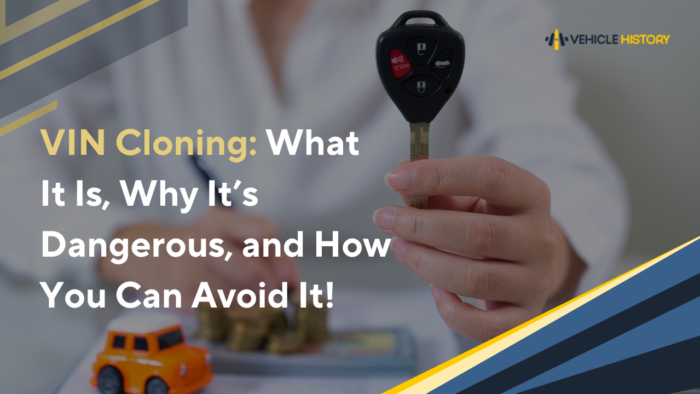VIN cloning poses a serious threat to car buyers and owners. Imagine purchasing a car only to discover it’s stolen or has a shady past. That’s the harsh reality of VIN cloning. This scam involves copying a vehicle identification number (VIN) from a legitimate car and using it on a stolen vehicle.
It can cost you money and lead to legal troubles. But don’t worry. You can protect yourself with the correct information and tools. In this article, we will explore the dangers of VIN cloning, how it works, and how you can safeguard yourself against it.
Why is VIN Cloning a Problem?
VIN cloning poses a significant threat to car buyers. When criminals clone a VIN, they make a stolen vehicle appear legitimate. This means that someone could unknowingly buy a stolen car, thinking it’s perfectly legal. Once you purchase a cloned vehicle, you might face severe consequences. Law enforcement may seize the car, leaving you without transportation and out of pocket for your investment.
The impact of VIN cloning extends beyond financial loss. It can also lead to legal issues. If the original owner reports their vehicle as stolen, you could find yourself in a complicated legal battle. You may have to prove that you bought the car in good faith, which can be challenging without proper documentation.
Moreover, VIN cloning undermines the integrity of the automotive market. It creates distrust among buyers and sellers alike. People become wary of purchasing used cars, fearing they might fall victim to scams. This can lead to decreased sales and lower prices for legitimate vehicles.
READ ALSO: What is the Best Site To Check the VIN Number
How Does VIN Cloning Work?
Understanding how VIN cloning works helps you stay vigilant. Every vehicle has a unique VIN, like a fingerprint. This number appears on the dashboard, door frame, and registration documents. Cloners take a legitimate VIN from a car, often a stolen one, and apply it to a stolen vehicle. They can even alter documents to make everything look genuine.
Criminals are savvy. They can change appearances to make cloned cars look new or well-maintained. This can deceive even experienced buyers. You might think you’re getting a great deal, but you could be buying trouble.
The Cloning Process
The process of cloning a VIN often involves stealing the VIN plate and other identifiers from a legitimate vehicle. Criminals then place these on a stolen car. They might even change the vehicle’s features to match those of the legitimate car. This makes it difficult for buyers to spot a clone.
Sometimes, the paperwork is just as convincing. Cloners can create fake registration documents that look authentic. They use high-quality printing to make the fakes hard to distinguish from the real thing. This deception can lead you to trust the seller more than you should.
How Do I Protect Myself from VIN Cloning?
Protecting yourself from VIN cloning requires some simple steps. Always conduct a thorough background check before buying a vehicle. Use tools like the VIN check tool at VehicleHistory.eu. This service provides valuable history reports, showing if a car has been reported stolen or involved in accidents.
Educate yourself on how to decode a VIN. Each character in a VIN has a specific meaning. Understanding this can help you identify potential issues. You can learn more about VIN decoding here. Knowing what to look for can make a huge difference.
Be cautious when dealing with private sellers. If a deal seems too good to be true, trust your instincts. Always ask for documentation. A legitimate seller should have no problem providing proof of ownership and vehicle history. If they hesitate or cannot provide clear answers, walk away.
Check the vehicle’s service history, too. A lack of maintenance records can signal potential issues. Find out how to access this information here. Knowing a car’s history can reveal if it has been well cared for or if it has hidden problems.
Using Professional Services
Consider using professional services for a thorough vehicle inspection. They can look for signs of VIN cloning and other potential issues. While it might cost a bit, it could save you from making a bad investment.
Always check the seller’s reputation. Look for reviews or feedback from previous customers. A reputable seller will have positive feedback and will be willing to answer your questions. Trust your gut; if something feels off, it probably is.
The Role of Law Enforcement
Law enforcement plays a crucial role in combating VIN cloning. They have specialized units that focus on vehicle fraud. Reporting suspicious vehicles can help them track down criminal operations. Your vigilance can contribute to a larger effort to fight vehicle crime.
If you ever suspect that your own vehicle has been cloned, report it immediately. Contact the authorities and provide them with all necessary documentation. Quick action can prevent further issues.
Conclusion
VIN cloning poses a real threat to car buyers. This scam can lead to financial loss and legal trouble. However, with the right knowledge and tools, you can protect yourself. Always perform thorough checks before making a purchase. Resources like the VIN check tool from VehicleHistory.eu can help ensure you make a safe choice.
Stay informed and vigilant. Protecting yourself from VIN cloning is possible. By taking these precautions, you can enjoy peace of mind while navigating the vehicle marketplace. Remember, a little caution goes a long way in ensuring you drive away with a car you can trust.
Your car is a significant investment. Don’t let VIN cloning ruin it. Use the tools available, educate yourself, and make informed choices. With a proactive approach, you can safeguard your purchase and enjoy your vehicle without worry.


